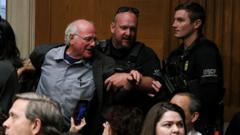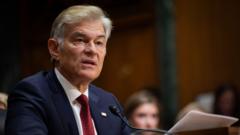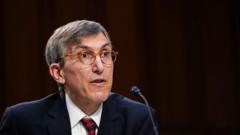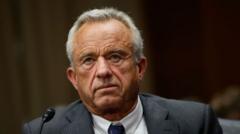The decision reflects a shift in public health strategy and raises concerns about future pandemic preparedness amid conflicting expert opinions.
**Funding Cut: RFK Jr Halts $500 Million for mRNA Vaccine Development**

**Funding Cut: RFK Jr Halts $500 Million for mRNA Vaccine Development**
U.S. Health Secretary Robert F. Kennedy Jr. cancels funding for mRNA vaccine initiatives, prompting intense debate over vaccine safety and efficacy.
The U.S. Department of Health and Human Services (HHS) has announced a cancellation of $500 million in funding designated for the development of mRNA vaccines aimed at combating viruses such as COVID-19 and seasonal influenza. The funding cut impacts 22 projects from leading pharmaceutical companies including Pfizer and Moderna, which have been developing vaccines tailored for bird flu and a range of other viral pathogens.
Health Secretary Robert F. Kennedy Jr., known for his controversial stance on vaccines, justified the funding withdrawal by contending that "mRNA technology poses more risks than benefits for these respiratory viruses." This assertion has elicited significant criticism from healthcare professionals and experts who emphasize the importance of vaccines in managing public health crises. A former official from the U.S. Food and Drug Administration, Peter Lurie, argued that this action represents a retreat from one of the most promising innovations in pandemic response.
In his official statement, Kennedy claimed that scientific reviews have indicated that mRNA vaccines are ineffective at providing protection against upper respiratory illnesses such as COVID-19 and influenza. He stated that the department will redirect funding toward vaccine platforms that have demonstrated a broader efficacy and safety record, especially in light of the continuous mutations observed in viral pathogens.
Kennedy has also raised concerns that mRNA vaccines may inadvertently contribute to the emergence of new viral mutations, potentially exacerbating pandemic conditions, although health experts clarify that mutations occur regardless of vaccination status, citing the annual variations seen with flu viruses as a historical example. Renowned vaccine expert Dr. Paul Offit has labeled mRNA vaccines as “remarkably safe” and essential in mitigating severe infections, particularly during the height of the COVID-19 pandemic.
Following the funding cut, HHS indicated that the Biomedical Advanced Research and Development Authority (BARDA), which oversees the vaccine projects, will focus its efforts on safer platforms with improved record-keeping in clinical trials and manufacturing processes.
The mRNA technology employed by Moderna and Pfizer integrates a method which instructs cells to produce proteins that elicit an immune reaction. Initial trials including thousands of participants confirmed the safety and effectiveness of these vaccines prior to their widespread deployment. Experts warn that the cancellation of this funding could jeopardize the United States’ readiness for future viral outbreaks, particularly given the rapid development timelines associated with mRNA vaccines, which were crucial in the response to the COVID crisis.
Kennedy’s administration has been characterized by a series of controversial actions, including the dismissal of all members of a key vaccine advisory committee and his decision to remove COVID-19 vaccines from the recommended immunization schedule for select demographics, such as healthy children and pregnant women.




















